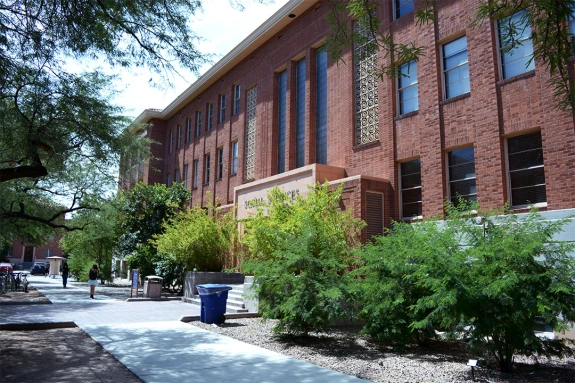
ABOUT THE SCHOOL
Arizona hosts one of the best sociology programs in the country as evidenced by the quality of the faculty and the recognition it receives. During the past 30 years, we have been consistently ranked in the top 30 of all sociology programs in the United States.
Mission
The overriding mission of the School of Sociology is to undertake all of its activities with excellence and distinction. Specifically, the School's tri-part mission includes relevant scholarship of the highest quality, undergraduate teaching and doctoral training, and service to the community, university and profession.
Programs Offered
Sociology at Arizona has a history of excellence in research and teaching, and has long been a wellspring of innovation in theory and methods.
Sociology explores and analyzes issues vital to our own lives, our communities, our nation, and the world. Our undergraduate majors provide a foundation for careers in many professional fields, and for graduate training as a sociologist in academia, government, business, and community agencies.
Our graduate training prepares students for careers in research and teaching. Our School is widely recognized as one of the top programs in the United States. Our faculty includes senior members who are nationally and internationally acknowledged authorities in their fields, and some of the best young scholars in the country.
We currently offer a B.A. in Sociology and a B.S. in Care, Health, & Society, as well as a new minor in Criminology. In 2019-20, the School hosts 553 undergraduate majors, 407 minors, and 45 graduate students.
According to our Academic Program Review in 2018, reviewers noted that “With its rich historical legacy, The School of Sociology is a gem for the University of Arizona…Arizona Sociology maintains a crucial position among sociology departments nationwide as an outstanding locus of research and graduate training.”
History of the School
Sociology has been taught and practiced on the Arizona campus since the turn of the century. A Department of Sociology was established in 1943, and the first Ph.D. in sociology was awarded in 1972. In 1982, only ten years after Arizona awarded its first Ph.D. in sociology, an assessment of doctoral programs ranked the University of Arizona School of Sociology #9 out of 92 programs in the United States. According to the University of Arizona 2010 NRC-R rankings, the School of Sociology was the third highest ranked PhD program among all of the departments that were ranked at the UA. Among sociology PhD programs housed in public institutions we ranked #6, and among PhD programs housed in all institutions (public & private) we ranked #12.
Principles of Community
University of Arizona's School of Sociology
· Knowledge: Our community is united by shared commitments to the preservation and advancement of knowledge. We are committed to ensuring intellectual freedom of thought, expression and dialogue, in a respectful and civil manner, on the spectrum of views held by our varied and diverse community. We recognize the right and value of every individual to think, speak, express and debate any idea limited only by university regulations governing time, place and manner.
· Integrity: We hold honesty and integrity in our teaching, learning, research and administration to the highest level. We strive to build a community of engaged learning marked by mutual respect, and in doing so, we affirm our individual and collective responsibility to uphold in words and actions the highest values of scholarship.
· Dignity: We affirm the intrinsic dignity in each of us as scholars, teachers, and human beings. Recognizing that today’s societies carry historical and divisive biases based on race, ethnicity, gender, age, disability, sexual orientation and religion, we seek to promote dignity through education and research.
· Inclusion: We embrace a community free from acts of hate, discrimination, harassment, or profiling on the basis of expression of race, color, ethnicity, gender, age, disability, religious beliefs, political preference, sexual orientation, gender identity, citizenship or national origin, among other personal characteristics. Further, we recognize our own fallibility as we do so.
These goals and principles are consistent with, and in no way supersede, university regulations regarding discrimination, freedom of expression and academic freedom.

